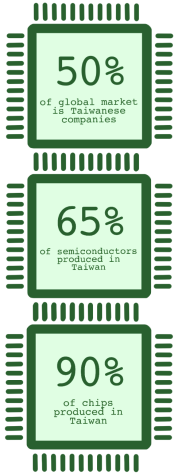US bars selling of certain chips to China amid rising tensions
Ban seeks to widen America’s technological advantage over China
Provided by commerce.gov
Silicon chip sale to China has been restricted with the CHIPS and Science Act passed by the Biden administration. “[The Biden administration] is doing this to buy time for the U.S. to get a large enough advance [so] that they can accomplish their strategic objectives, get whatever security threshold they want and maybe get some concessions [from China],” upper school history and social science teacher Matt McCorkle said.
November 13, 2022
The Biden administration tightened restrictions on the sale of computer chips to China on Oct. 7, extending a previous August ban. Along with the CHIPS and Science Act, which President Joe Biden signed into law on Aug. 9, these bans seek to maintain the U.S.’s “scientific and technological edge” and increase domestic production.
On Aug. 26, Silicon Valley companies Nvidia and Advanced Micro Devices (AMD) reported that they could no longer sell several of their Graphical Processing Unit (GPU) models. The more recent October ban extended the August ban of chips under 14 nanometers to some chips under 16 nanometers. This ban also places further restrictions on American companies’ abilities to ship equipment to Chinese factories. The Biden administration hopes that these bans will hamper China’s GPU-making ability as the country tries to produce these chips independently.
China has condemned the recent move. In an Oct. 8 statement after the Biden Administration announced the most recent ban, the spokesman for the Chinese Ministry of Foreign Affairs, Mao Ning, accused the U.S. of politicizing science and using it to contain China’s growth.
“By politicizing tech and trade issues and using them as a tool and weapon, the US cannot hold back China’s development but will only hurt and isolate itself when its action backfires,” Mao said in the statement.
Alongside the bans, Biden also passed the CHIPS and Science Act, which offers $280 billion, including $52.7 billion in subsidies, to semiconductor companies in order to stimulate GPU production on American soil. Intel, a major producer of chips, will use part of the subsidy to boost its existing plants within the United States. Other producers, such as Taiwan Semiconductor Manufacturing Company (TSMC) and Texas Instruments will seek to improve their chip-manufacturing capacities.

“[The Biden administration] is doing this to buy time for the U.S. to get a large enough advance [so] that they can accomplish their strategic objectives, get whatever security threshold they want and maybe get some concessions [from China],” upper school history and social science teacher Matt McCorkle said. “We’ll see if their strategic assessments are accurate.”
GPUs are an advanced computer chip once used by video game developers to display images. In the last decade, these chips have become popular in artificial intelligence due to their computing speed and power. Several companies, including Google and Amazon, have purchased these chips for their machine learning projects. China also uses GPUs in the technology industry, with companies such as Huawei using these chips in their phones for purposes such as rendering mobile games.
GPUs can also be used for other purposes, some of which have raised concerns for the Biden administration. A report by Ryan Fedasiuk, the China Technology Policy Advisor at the Department of State, and other authors from Georgetown University’s Center for Security and Emerging Technology reveals that China has been buying GPUs from companies such as Nvidia and AMD to use them in the military.
“The military started computers in general [because] they wanted to be able to calculate missile trajectories,” upper school computer science teacher Marina Peregrino said. “That was, in a lot of ways, the push for a lot of this technology.”
However, the Biden administration is alarmed at China’s use of GPUs in not only the military but also in surveillance. A U.N. report, which suggests Muslim minorities in the Xinjiang province are victims of crimes against humanity, found that China is using surveillance to monitor these minorities. Projects which generally require a significant amount of computing power, such as these suspected surveillance endeavors, require many GPUs.
Another source of tension is Taiwan, which produces a majority of the semiconductors that Nvidia and AMD purchase to make their chips. Beijing designs chips on their own, but relies heavily on Taiwanese factories to produce semiconductors. While historically the chip-making process has gone smoothly, more recent events are beginning to disturb the flow. For instance, Speaker of the House Nancy Pelosi’s visit over the summer has brought up fears of a Chinese blockade which would prevent Taiwan from exporting its chips. If put in place, this blockade could disrupt supply lines, worsening an already severe shortage of chips.
“I think it’s going to be quite interesting to see whether China will have to go to Taiwan in order to get semiconductor materials,” said upper school Model United Nations Under Secretary-General Sasha Masson (11). “Who will China turn to?”




![LALC Vice President of External Affairs Raeanne Li (11) explains the International Phonetic Alphabet to attendees. "We decided to have more fun topics this year instead of just talking about the same things every year so our older members can also [enjoy],” Raeanne said.](https://harkeraquila.com/wp-content/uploads/2025/10/DSC_4627-1200x795.jpg)


















![“[Building nerf blasters] became this outlet of creativity for me that hasn't been matched by anything else. The process [of] making a build complete to your desire is such a painstakingly difficult process, but I've had to learn from [the skills needed from] soldering to proper painting. There's so many different options for everything, if you think about it, it exists. The best part is [that] if it doesn't exist, you can build it yourself," Ishaan Parate said.](https://harkeraquila.com/wp-content/uploads/2022/08/DSC_8149-900x604.jpg)




![“When I came into high school, I was ready to be a follower. But DECA was a game changer for me. It helped me overcome my fear of public speaking, and it's played such a major role in who I've become today. To be able to successfully lead a chapter of 150 students, an officer team and be one of the upperclassmen I once really admired is something I'm [really] proud of,” Anvitha Tummala ('21) said.](https://harkeraquila.com/wp-content/uploads/2021/07/Screen-Shot-2021-07-25-at-9.50.05-AM-900x594.png)







![“I think getting up in the morning and having a sense of purpose [is exciting]. I think without a certain amount of drive, life is kind of obsolete and mundane, and I think having that every single day is what makes each day unique and kind of makes life exciting,” Neymika Jain (12) said.](https://harkeraquila.com/wp-content/uploads/2017/06/Screen-Shot-2017-06-03-at-4.54.16-PM.png)








![“My slogan is ‘slow feet, don’t eat, and I’m hungry.’ You need to run fast to get where you are–you aren't going to get those championships if you aren't fast,” Angel Cervantes (12) said. “I want to do well in school on my tests and in track and win championships for my team. I live by that, [and] I can do that anywhere: in the classroom or on the field.”](https://harkeraquila.com/wp-content/uploads/2018/06/DSC5146-900x601.jpg)
![“[Volleyball has] taught me how to fall correctly, and another thing it taught is that you don’t have to be the best at something to be good at it. If you just hit the ball in a smart way, then it still scores points and you’re good at it. You could be a background player and still make a much bigger impact on the team than you would think,” Anya Gert (’20) said.](https://harkeraquila.com/wp-content/uploads/2020/06/AnnaGert_JinTuan_HoHPhotoEdited-600x900.jpeg)

![“I'm not nearly there yet, but [my confidence has] definitely been getting better since I was pretty shy and timid coming into Harker my freshman year. I know that there's a lot of people that are really confident in what they do, and I really admire them. Everyone's so driven and that has really pushed me to kind of try to find my own place in high school and be more confident,” Alyssa Huang (’20) said.](https://harkeraquila.com/wp-content/uploads/2020/06/AlyssaHuang_EmilyChen_HoHPhoto-900x749.jpeg)



![Silicon chip sale to China has been restricted with the CHIPS and Science Act passed by the Biden administration. “[The Biden administration] is doing this to buy time for the U.S. to get a large enough advance [so] that they can accomplish their strategic objectives, get whatever security threshold they want and maybe get some concessions [from China],” upper school history and social science teacher Matt McCorkle said.](https://harkeraquila.com/wp-content/uploads/2022/11/chipsforamerica-webinar.jpeg)








